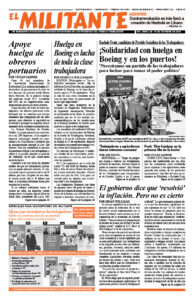Labor, Nature, and the Evolution of Humanity: The Long View of History by Frederick Engels, Karl Marx, George Novack and Mary-Alice Waters is one of Pathfinder’s Books of the Month for October. The collection of writings covers the sweep of human history, from the emergence of our earliest ancestors, through the evolution of class society, up to capitalism and the development of the modern working class today. The book is a timely introduction to scientific socialism, generalized from the class struggle by Marx and Engels beginning in the mid-1800s. The excerpts are from the first chapter by Mary-Alice Waters, “Without materialist dialectics, there can be no working-class revolution.” Copyright © 2021 by Pathfinder Press. Reprinted by permission.
The book includes “The Part Played by Labor in the Transition from Ape to Man” by Frederick Engels, who along with Karl Marx made up the founding leadership of the modern working-class movement. Engels’s unfinished text drew on the groundbreaking discoveries of Charles Darwin and other nineteenth-century pioneers in what was then the young science of evolutionary biology. …
In it Engels explains the place of labor, the “basic condition for all human existence,” in transforming nature and ourselves, creating the conditions out of which human society is born. He explains the centrality of the evolution of the human hand with its opposable thumb and resulting facility in making and using tools. From that beginning, speech, the enlarging human brain, and other attributes distinguishing us from the rest of the animal world have evolved.
It is the history of human social relations, however, that Engels focuses on above all, relations developed over millennia as our productive capacities expanded. “The animal merely uses its environment,” Engels writes. “Man by his changes makes it serve his ends, masters it,” and passes along knowledge and new skills from one generation to the next. “This is the final, essential distinction between man and other animals, and once again it is labor that brings this about.”
In explaining this interconnection of social labor and nature, Engels built on the materialist foundations laid by Marx. Capitalism expands production only “by simultaneously undermining the original sources of all wealth — the soil and the worker,” nature and labor, as Marx wrote in Capital. Beginning with the simplest elements of capitalism — the individual commodity and wage-labor, which were leading to the modern factory system of production and trade — Marx went on to demonstrate why only the working-class conquest of power can preserve not just life and limb but an earth, skies, and waters compatible with human development. …
Such an understanding of history is important in face of today’s spreading “cancel culture” among privileged middle-class layers in the universities, foundations, media and government circles, as well as the profoundly anti-working-class, anti-science “woke” politics they promote. …
Charles Darwin, the pioneer of evolutionary biology and one of the most outstanding scientists of the nineteenth century, has now joined the long line of targets. …
Marx, Engels, and Novack, like their contemporaries, use the terms “savagery,” “barbarism,” and “civilization” when writing about three main stages of human social evolution. Those were the terms used by anthropologists in the nineteenth and most of the twentieth centuries to denote the earliest human societies based on hunting and gathering (savagery), pre-class agricultural societies (barbarism), and class-divided societies (civilization). The first class societies — whether in Mesopotamia or Egypt, Greece or Rome, or most of Asia — came initially with slavery as the increasingly dominant mode of production, along with the advent of writing, major urban concentrations, and large-scale commerce. …
“It is very easy to inveigh against slavery and similar things in general terms, and to give vent to high moral indignation at such infamies,” wrote Engels in 1877 in a book-length polemic against Eugen Dühring, a self-important German professor with influence in socialist currents of the times. … “But it does not tell us one word as to how these institutions arose, why they existed, and what role they played in history.”
In turning up his nose at Greek civilization “because it was founded on slavery,” Engels said, Dühring “might with equal justice reproach the Greeks with having had no steam-engines or electric telegraphs.” …
Class-divided societies, of which capitalism is but the most recent stage, arose only a few thousand years ago. That’s not even a blink of the eye in the history of humanity. Those class divisions emerged along with the increasingly productive social labor of our ancestors, which enabled them to produce more than needed for mere survival. Along with that surplus, however, arose private property, priesthoods, and states, together with their armies and other repressive institutions used to defend the property, power, and privileges of the ruling few.
For its part, the social and political dictatorship of capital is barely a few hundred years old. Based on work for wages by the great majority of us who have no property to live off and must sell our ability to labor to an employer, capitalism too had a beginning under particular historical conditions. It will have an end under others.
Armed with this long view of history, a working-class vanguard of all nationalities, religions, skin colors, and both sexes — engaged in struggles together with millions of other working people — can develop the experience, political confidence, and fighting capacities to chart a revolutionary course. A course that can take state power out of the hands of the propertied rulers and build governing institutions created by the working class. Only then will a society worth living in for the great majority, one free of class exploitation and oppression, become possible.


